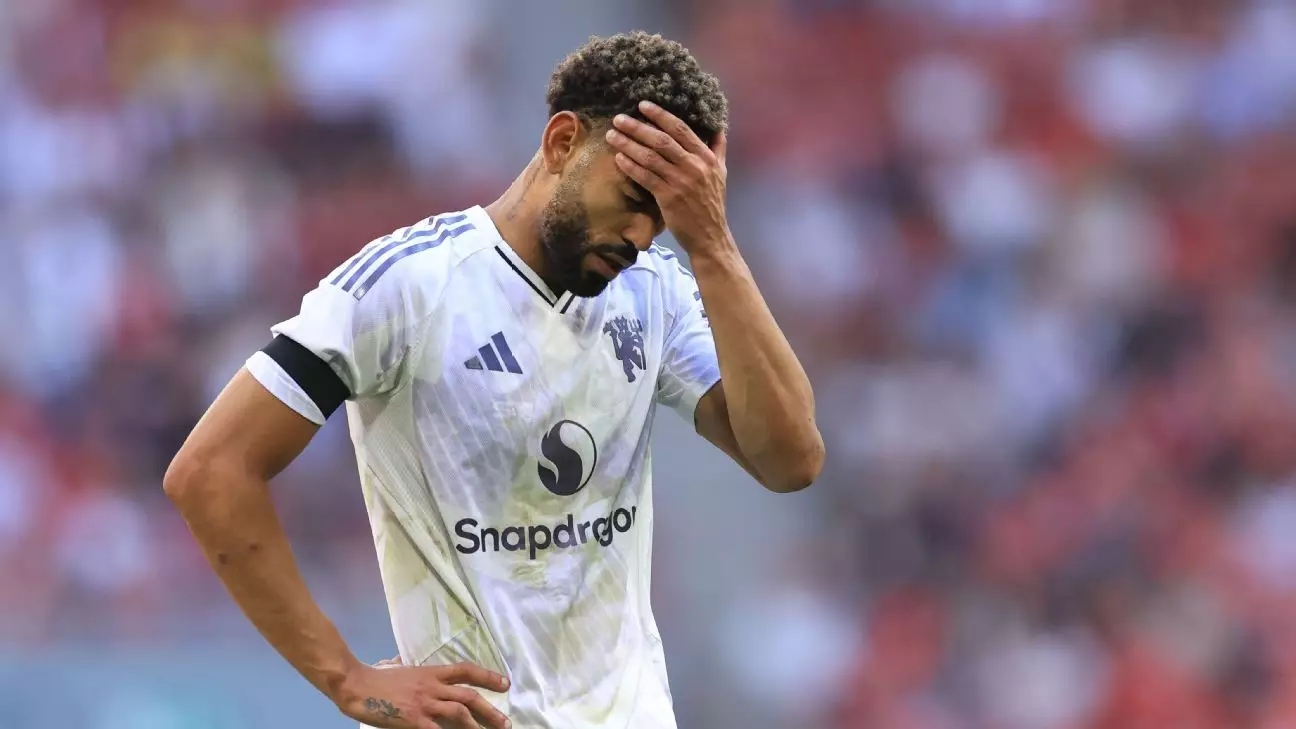Manchester United’s recent preseason debut revealed critical flaws that threaten to undermine their ambitions for the upcoming season. The match against Leeds, ending in a goalless draw, served as a sobering reminder that despite the transfer window’s efforts, the squad remains fundamentally out of sync. Analysts and fans alike have noted that the team’s inability to inject pace into their gameplay hampers their ability to break down organized defenses and create genuine scoring opportunities. The absence of incisiveness in front of goal — evidenced by last season’s meager tally of just 44 Premier League goals — persists as a glaring issue. The signing of Matheus Cunha was supposed to address some of these deficiencies, but a glance at the game’s pattern indicates that the integration of new players into the team’s attacking fabric is still in its infancy.
The noticeable disconnect between Cunha and Bruno Fernandes exemplifies how far the team is from cohesion. Although Cunha showed flashes of the aggression and movement needed between the lines, the synergy with Fernandes remains underdeveloped. A lack of understanding and chemistry in the final third leaves the team riding on sporadic opportunities rather than sustained pressure. This scenario underscores that signing talented players alone isn’t enough; building an attack that operates with rhythm and fluidity is paramount. Without enhanced link-up play and increased dynamism, United risks continuing to struggle in front of goal, which could be detrimental as they face sterner competition in the season ahead.
Strategic Transfer Targets: The Urgency of Speed and Creativity
The impending arrival of Bryan Mbeumo from Brentford offers a glimmer of hope that Manchester United recognizes the need for speed. Mbeumo’s quickness and directness could inject the urgency that has been sorely lacking in United’s attack. However, relying solely on one player to transform a team’s offensive identity is an oversimplification. What the team truly needs is a collective shift — increased tempo, sharper decision-making, and consistent connection between midfield and attack.
The club is also reportedly on the trail of Randal Kolo Muani, whose versatility and pace could serve as catalysts for a more dynamic offensive approach. The challenge is integrating these new additions into a cohesive system that prioritizes rapid transitions and precise movements in the final third. Such change requires not just technical adjustments but also a cultural shift within the squad, emphasizing quick thinking and unselfish play. Without this evolution, United may continue to operate with predictability, making it easier for opponents to neutralize their intentions.
Leadership, Morale, and the Road Forward
Despite the evident tactical shortcomings, manager Ruben Amorim’s optimistic stance offers a fresh perspective. He emphasizes camaraderie and a resilient team spirit, asserting that internal morale remains strong amid the turbulence. His assertion that struggle will be faced together speaks to a team committed to growth, but it also risks glossing over the urgency of fixing tactical flaws. Morale alone cannot compensate for structural weaknesses; execution on the pitch must improve if the club hopes to challenge top-tier opponents effectively.
The upcoming U.S. pre-season tour will be a critical testing ground for these ambitions. Matches against West Ham, Bournemouth, and Everton will serve not only as fitness exercises but as opportunities to develop synergy and refine tactical approaches. Amorim rightly stresses the importance of building bonds between players and staff, but he also acknowledges that process alone isn’t enough — quality, speed, and clinicality need immediate elevation. Failing to address these issues efficiently could result in a season characterized by inconsistency and disappointment despite the hope and investment behind Manchester United’s summer reshuffle.
The Broader Implication: A Club at a Crossroads
Manchester United stands at a pivotal juncture. The club’s history and stature demand more than just effort — they require mastery, innovation, and resolve. The squad’s current state, as revealed in the opening preseason run, highlights that raw talent isn’t enough. The team must evolve into a unit that plays with relentless pace and creativity, transforming possession into meaningful scoring chances.
Amorim’s candor about the team’s deficiencies suggests an awareness that change is essential. Whether the club’s recent signings and strategic planning will be enough to catalyze this transformation remains to be seen. If United fail to rapidly adapt and bolster their attacking potency, they risk falling further behind the competition, damaging their reputation and jeopardizing their ambitions both domestically and in Europe. Only through decisive action and unwavering focus on tactical improvement can Manchester United truly realize the potential that their historic stature demands.

